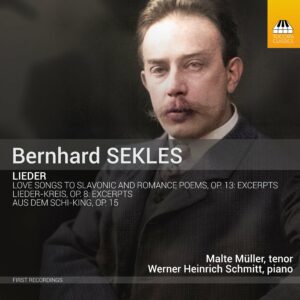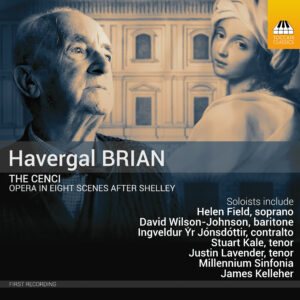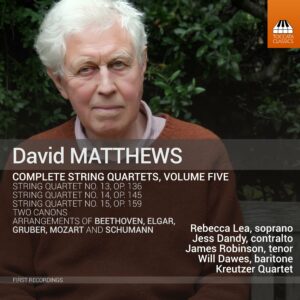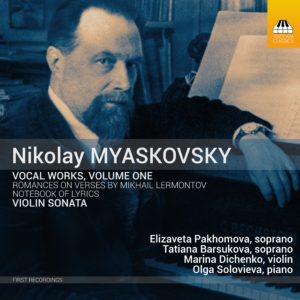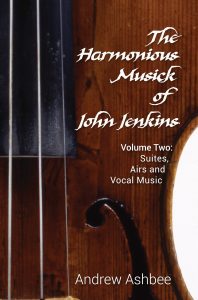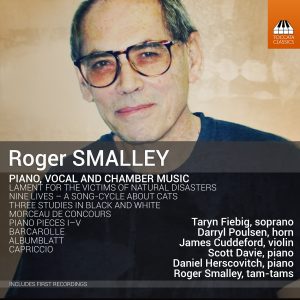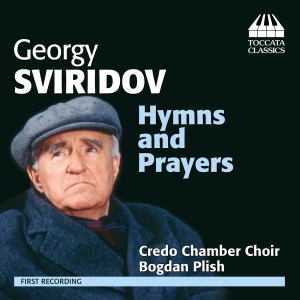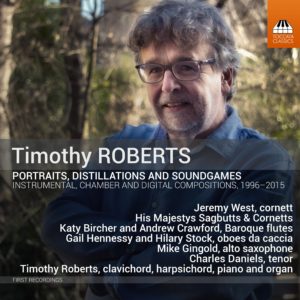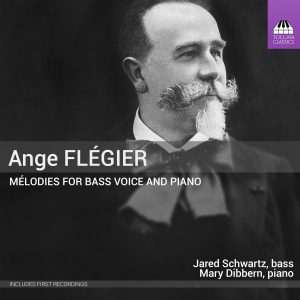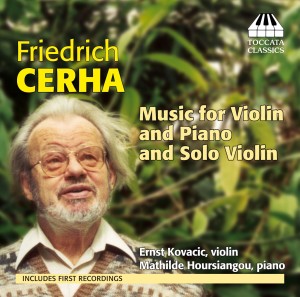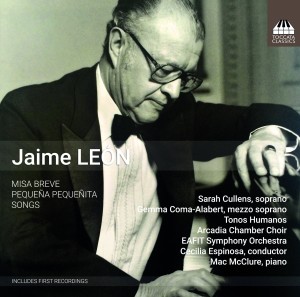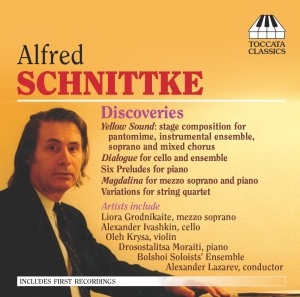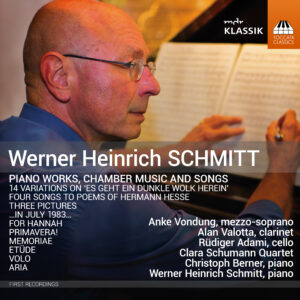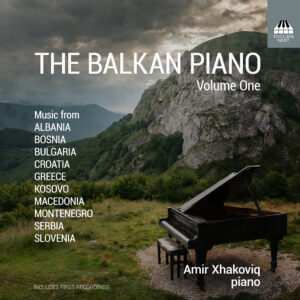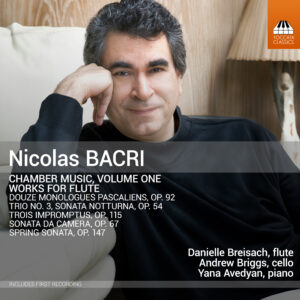Search Results for "1997 Bilbao International Vocal Competition winner Chinese tenor" – Page 2
Showing results for 1997 bulb international vocal competition winner chinese tenor 1997 tenor 1997 1997 1997
Bernhard Sekles: Lieder – Aus dem Schi-King and other Songs
Bernhard Sekles (1872–1934) was one of the leading figures in German music in the first decades of the twentieth century, prominent as composer, educator and administrator. In 1928, as director of the Hoch Conservatorium in Frankfurt, he established the first academic programme in jazz studies, an act of courage and conviction that unleashed furious attacks from the Nazi press. His own late-Romantic music, banned during the Third Reich, has been virtually forgotten, although he composed in all major genres, including opera, orchestral works and chamber music. This first-ever album of his Lieder includes a major song-cycle, the freewheeling Aus dem Schi-King, based on ancient Chinese poetry in adaptations by Friedrich Rückert, its moods ranging from the heroic to the comic.
Malte Müller, tenor
Werner Heinrich Schmitt, piano
Mit Deutschem Kommentar
Havergal Brian: The Cenci
The Cenci (1951–52) is Havergal Brian’s operatic realisation of Shelley’s gruesome tale of incest and parricide in Renaissance Italy. The score calls it simply ‘Opera in Eight Scenes’, but it rarely goes in for grand tunes; instead, its dark colours reflect Shelley’s fascination with the struggle between good and evil. Stylistically, it is an unusual but highly effective hybrid: a music-drama focused on the intense delivery of Shelley’s text, with the declamatory style of the vocal lines echoing such recent oratorios as Stravinsky’s Oedipus Rex and Honegger’s Jeanne d’Arc au bûcher, and the freewheeling orchestral writing producing something of a vocal symphony.
Helen Field, soprano
David Wilson-Johnson, baritone
Ingveldur Ýr Jónsdóttir, contralto
Stuart Kale, tenor
Justin Lavender, tenor
Jeffery Carl, baritone
Nicholas Buxton, tenor
Devon Harrison, bass
Serena Kay, soprano
The Millennium Sinfonia
James Kelleher, conductor
David Matthews: Complete String Quartets, Volume Five
The American critic Robert Reilly described the music on Volume One of this cycle of the complete string quartets of David Matthews (b. 1943) as ‘some of the most concentrated, penetrating writing for this medium in the past 30 years or more. It is musical thinking of the highest order and quartet writing in the great tradition of Beethoven, Bartók, Britten, and Tippett’. Matthews’ three most recent quartets call in a wide range of references. Birdsong – heard in Nos. 13 and 14 – is a standard Matthews topos; and the fugal No. 15 seems to find a middle ground between late Beethoven and folk-music. No. 13 presents the biggest surprise: it introduces four solo voices, siting the work somewhere between Berg’s Lyric Suite and Vaughan Williams’ Serenade to Music. Some touching arrangements and two canons for two Michaels – Tippett and Berkeley – complete the programme.
Rebecca Lea, soprano 8
Jess Dandy, contralto 8
James Robinson, tenor 8
Will Dawes, baritone 8
Kreutzer Quartet
Peter Sheppard Skærved and Mihailo Trandafilovski, violins
Clifton Harrison, viola
Neil Heyde, cello
Nikolai Myaskovsky: Vocal Works, Volume One
The dignified bearing and quiet wisdom of Nikolai Myaskovsky (1881–1950) gained him the sobriquet of ‘the conscience of Russian music’ – and those qualities are reflected in the unemphatic strength of his music. His orchestral, chamber and instrumental works are regaining the currency they once enjoyed, but his large corpus of songs, many of them understated masterpieces, has yet to attract systematic attention – a situation this series hopes to remedy. The pairing here of his late Violin Sonata with his last two song-cycles for soprano and piano mirrors the Moscow concert in 1947 when all three were given their first performances.
Elizaveta Pakhomova, soprano
Tatiana Barsukova, soprano
Marina Dichenko, violin
Olga Solovieva, piano
The Harmonious Musick of John Jenkins: Volume Two: Suites, Airs and Vocal Music
Extent: 311 pages
Composition: Demy octavo
8 illustrations, b/w
82 music examples
List of Sources for Jenkins’ Music
List of Jenkins’ Works
Bibliography
Select Discography
Roger SMALLEY: Piano, Vocal and Chamber Music
Roger Smalley (1943–2015) made his mark, first in his native Britain and then in Australia, as composer, pianist, conductor, writer, academic and teacher. Although as performer and commentator he was at the forefront of musical modernism, he was also very fond of nineteenth-century Romanticism, and much of his music bridges the gap between old and new, retaining its roots in the past while reflecting the concerns of his own time, as the works on this album demonstrate.
Taryn Fiebig, soprano (Tracks 2–10)
Darryl Poulsen, horn (Tracks 22)
James Cuddeford, violin (Tracks 11)
Daniel Herscovitch, piano (Track 1)
Scott Davie, piano (Tracks 2–10)
Roger Smalley, tam-tams (Track 22)
Georgy Sviridov: Hymns and Prayers
Gyorgy Sviridov (1915-98) saw himself as part of the thousand-year continuum of Russian culture, giving its resonance full expression in the monumental choral cycle Hymns and Prayers, written over a ten-year period from 1987 to 1997; he completed it only weeks before he died. Extraordinarily beautiful and profoundly moving, Hymns and Prayers is perhaps the most important Russian choral composition since the liturgies of Tchaikovsky and Rachmaninov. At this time of tension between Russia and Ukraine, here a Ukrainian choir sings a Russian masterpiece.
Credo Chamber Choir, cond. Bogdan Plish; Ivanna Bondaruk, soprano; Yuliya Zuveya, mezzo soprano; Roman (Podlubnyak), celibate deacon, tenor; Roman Pachashynsky, tenor; Nazar Yakobenchuk, baritone; Tarasiy (Mudrak), archdeacon, bass;
Timothy Roberts: Portraits, Distillations and Soundgames
Timothy Roberts, born in Hampstead, north London, in 1953, has been a mainstay of the early-music scene in Britain and further afield for decades. He is best known as a keyboard player, but in recent years composing has been of growing importance to him. Hardly surprisingly, his music refracts the Baroque and Classical world in which he is active, usually with a playful but respectful twist.
Jeremy West, cornett (tracks 1–13, 17–23)
Timothy Roberts, harpsichord (tracks 2–15), piano (tracks 11–16), clavichord (track 14), organ (track 22)
His Majestys Sagbutts & Cornetts (tracks 5–10)
Katy Bircher and Andrew Crawford, Baroque flutes (tracks 18–21)
Gail Hennessy and Hilary Stock, oboes da caccia (tracks 18–21)
Mike Gingold, alto saxophone (track 24)
Charles Daniels, tenor (track 27)
Digital compositions (tracks 24, 26–28)
Ange Flégier: Mélodies for Bass Voice and Piano
Although the French composer Ange Flégier (1846–1927) has now been lost from view, he enjoyed considerable fame in his own time thanks to the extraordinary reception of his song Le Cor. Indeed, the mélodie holds a predominant place in his catalogue of more than 350 works. Flégier’s songs, composed for his colleagues at the Opéra de Paris, are large-scale and orchestrally conceived, sitting stylistically close to Duparc in their dignified drama. Many of them receive their first recordings or first modern recordings here.
Jared Schwartz, bass
Mary Dibbern, piano
Thomas Demer, viola (Track 9)
Friedrich Cerha: Music for Violin and Piano and Solo Violin
Friedrich Cerha, born in Vienna in 1926, is the doyen of Austrian composers, with a huge catalogue of music to his name. Cerha also trained as a violinist and most of the works in this anthology of his violin pieces were written for himself to play in the 1940s and '50s, when he was still active as a performer. It begins with his first surviving composition, the Hindemith-like First Violin Sonata of 1947; Stravinsky was another early influence before Cerha found the voice that made him Austria's leading avant-garde composer. Two later works, from almost half a century on, complete the stylistic trajectory.
Ernst Kovacic, violin
Mathilde Hoursiangou, piano
Jaime León: Vocal Music
Born in 1921, Jaime León is now the Grand Old Man of Colombian music. A vital figure in the development of Colombian art-music, León has been pianist (he is a grand-student of Clara Schumann), conductor, teacher, administrator and composer. His Misa breve has an innocent sincerity reminiscent of Poulenc's religious music, and although the word-setting in his songs is subtle and imaginative, they have the same melodic immediacy and uncomplicated appeal.
Sarah Cullens, soprano; Gemma Coma-Alabert, mezzo soprano; Tonos Humanos; Arcadia Chamber Choir; EAFIT Symphony Orchestra; Cecilia Espinosa, conductor; Mac McClure, piano
Alfred Schnittke: Discoveries
The output of Alfred Schnittke (1934-98) has been documented in recordings more thoroughly than that of any other Russian composer since Shostakovich. But there are a number of works which have not yet been released on CD, and four of the five here are not only first recordings; they also document Schnittke's stylistic evolution over more than four decades of creative activity, moving from the relatively traditional Preludes, via the serial Dialogue and the experimental Yellow Sound to the elliptical Variations, one of his last works, written in the teeth of enormous physical difficulty.
Drosostalitsa Moraiti, piano
Alexander Ivashkin, cello
Ensemble Pentaèdre de Montréal, ensemble
Jeremy Bell, conductor
Nelly Lee, soprano
Bolshoi Soloists’ Ensemble, ensemble
Alexander Lazarev, conductor
Liora Grodnikaite, mezzo soprano
Oleh Krysa, violin
Natalia Lomeiko, violin
Konstantin Boyarsky, viola
Anatol Vieru: Piano and Chamber Music
The music of the Romanian composer Anatol Vieru (1926–98) is an arresting fusion of classical procedures, avant-garde modernism and folk roots; the influence of his Jewish heritage – he narrowly escaped a pogrom in the ghetto of his native Iaşi in 1944 – also underlies his musical impulses. These divergent influences fed into a musical language that is simultaneously familiar and intriguingly unconventional, with hypnotic, quasi-minimalist passages rubbing shoulders with bursts of wild, gypsy-like energy. It can likewise encompass both an epic sense of scale and chuckling good humour.
Daniela Braun, violin
Anna Carewe, cello
Irmela Roelcke, piano
Werner Heinrich Schmitt: Piano Works, Chamber Music and Songs
Werner Heinrich Schmitt, born in Mannheim in 1961, began to study the piano in boyhood, and soon started to compose as well. Since then he has earned his living as a pianist, writing music as time permitted. This first album of his works reveals a composer of considerable substance, particularly in the two moving song-cycles that book-end this album. The sensitivity and resourcefulness of Schmitt’s aural imagination are confirmed in the chamber and piano pieces heard here. Some are infused with joy, others with sorrow, but they all speak a musical language that aims to speak to the listener directly.
Anke Vondung, mezzo-soprano
Alan Valotta, clarinet
Rüdiger Adami, cello
Clara Schumann Quartet
Christoph Berner, piano
Werner Heinrich Schmitt, piano
The Balkan Piano, Volume One
The composing traditions of the ten Balkan countries are as good as unknown in the rest of the world. In this revelatory piano recital, the Albanian pianist Amir Xhakoviq presents a glittering array of keyboard jewels from his own country and its neighbours, ranging from wild and energetic toccatas to timeless evocations of bells and other ancient traditions, with a surprisingly wide range of references, from folk-music to Scarlatti and jazz. As ‘Volume One’ indicates, this album is intended as the first of a series that will continue to explore the unfamiliar music of the Balkans.
Amir Xhakoviq, piano
Nicolas Bacri: Chamber Music, Volume One – Works for Flute
It may be a cliché to write of the clarity of Gallic writing for the flute – the kind of elegance found in the music of composers like Debussy, Fauré, Gaubert, Jolivet, Messiaen and Taffanel – but French music for flute does indeed have a sound of its own. The flute works of Nicolas Bacri, born in Paris in 1961, uphold the proud tradition of his predecessors with textures of crystalline transparency and poised, almost weightless, melodic lines – and reserves of sardonic bite and freewheeling energy as required.
Danielle Breisach, flute
Yana Avedyan, piano
Andrew Briggs, cello
Stay In the Know
JOIN THE TOCCATA NEWSLETTER
"*" indicates required fields
By visiting our site, you agree to our privacy policy regarding cookies, tracking statistics, etc.
